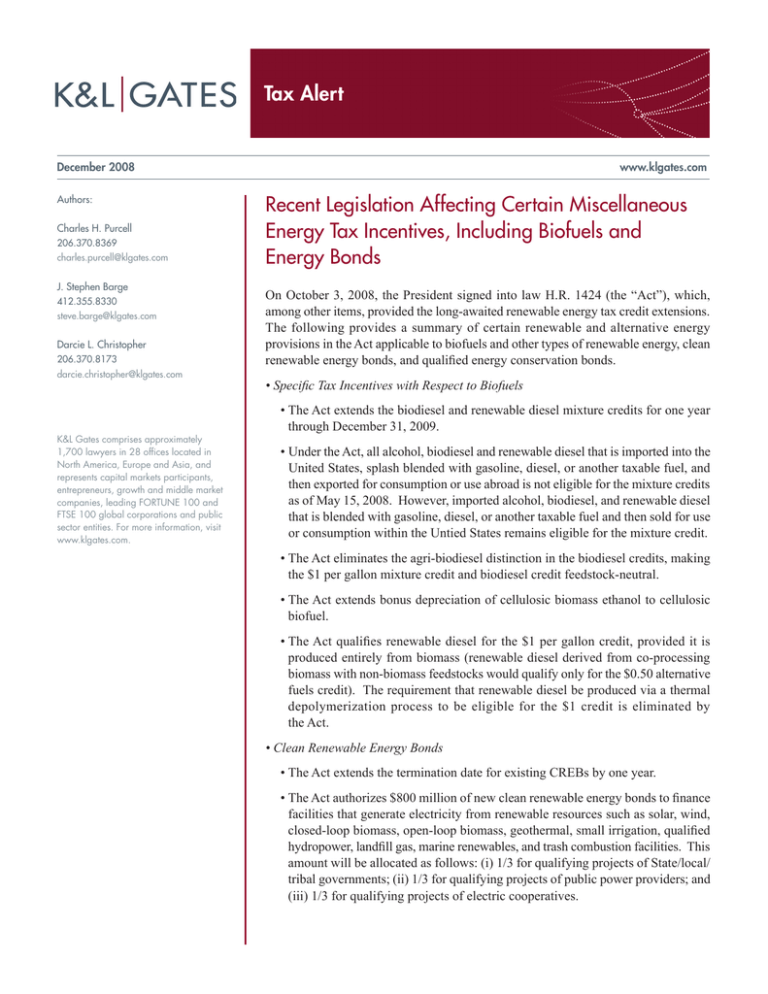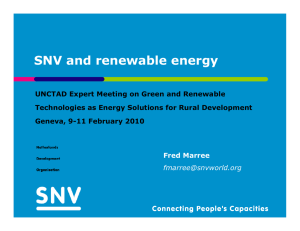
Tax Alert
December 2008
Authors:
Charles H. Purcell
206.370.8369
charles.purcell@klgates.com
J. Stephen Barge
412.355.8330
steve.barge@klgates.com
Darcie L. Christopher
206.370.8173
darcie.christopher@klgates.com
K&L Gates comprises approximately
1,700 lawyers in 28 offices located in
North America, Europe and Asia, and
represents capital markets participants,
entrepreneurs, growth and middle market
companies, leading FORTUNE 100 and
FTSE 100 global corporations and public
sector entities. For more information, visit
www.klgates.com.
www.klgates.com
Recent Legislation Affecting Certain Miscellaneous
Energy Tax Incentives, Including Biofuels and
Energy Bonds
On October 3, 2008, the President signed into law H.R. 1424 (the “Act”), which,
among other items, provided the long-awaited renewable energy tax credit extensions.
The following provides a summary of certain renewable and alternative energy
provisions in the Act applicable to biofuels and other types of renewable energy, clean
renewable energy bonds, and qualified energy conservation bonds.
• Specific Tax Incentives with Respect to Biofuels
• The Act extends the biodiesel and renewable diesel mixture credits for one year
through December 31, 2009.
• Under the Act, all alcohol, biodiesel and renewable diesel that is imported into the
United States, splash blended with gasoline, diesel, or another taxable fuel, and
then exported for consumption or use abroad is not eligible for the mixture credits
as of May 15, 2008. However, imported alcohol, biodiesel, and renewable diesel
that is blended with gasoline, diesel, or another taxable fuel and then sold for use
or consumption within the Untied States remains eligible for the mixture credit.
• The Act eliminates the agri-biodiesel distinction in the biodiesel credits, making
the $1 per gallon mixture credit and biodiesel credit feedstock-neutral.
• The Act extends bonus depreciation of cellulosic biomass ethanol to cellulosic
biofuel.
• The Act qualifies renewable diesel for the $1 per gallon credit, provided it is
produced entirely from biomass (renewable diesel derived from co-processing
biomass with non-biomass feedstocks would qualify only for the $0.50 alternative
fuels credit). The requirement that renewable diesel be produced via a thermal
depolymerization process to be eligible for the $1 credit is eliminated by
the Act.
• Clean Renewable Energy Bonds
• The Act extends the termination date for existing CREBs by one year.
• The Act authorizes $800 million of new clean renewable energy bonds to finance
facilities that generate electricity from renewable resources such as solar, wind,
closed-loop biomass, open-loop biomass, geothermal, small irrigation, qualified
hydropower, landfill gas, marine renewables, and trash combustion facilities. This
amount will be allocated as follows: (i) 1/3 for qualifying projects of State/local/
tribal governments; (ii) 1/3 for qualifying projects of public power providers; and
(iii) 1/3 for qualifying projects of electric cooperatives.
Tax Alert
• Q ualified Energy Conservation Bonds. The
Act creates a new category of tax credit bonds,
“Qualified Energy Conservation Bonds”
(“QECBs”) that are intended to finance State and
local government initiatives designed to reduce
greenhouse emissions. QECBs can be issued
to finance capital expenditures incurred for the
following: (i) reducing energy consumption by
at least 20%; (ii) implementing green community
programs; and (iii) encouraging rural development
involving the production of electricity from
renewable resources. QECBs can also be used
to finance research facilities and provide research
grants for, among other things, technologies to
reduce peak use of electricity.
• Credit for Investment in Qualifying Advanced
Coal Projects. An investment credit is allowed for
investment in qualifying advanced coal projects.
The Act expands the amount of the aggregate
credits under this provision from $1.3 billion to
$2.55 billion and creates a new 30% credit for the
tax year for certain advanced coal-based generation
technology projects.
• Coal Gasification Investment Credit. The Act
increases the qualifying gasification project credit
for any tax year to 30% of the qualified investment
for the tax year for credits that are allocated or
reallocated after October 3, 2008.
• Carbon Dioxide Sequestration Credit. The Act
creates a carbon dioxide sequestration credit. The
amount of such credit is generally equal to either (i)
$20 per metric ton of qualified carbon dioxide that
is captured by the taxpayer at a qualified facility
and disposed of in secure geological storage, and
(ii) $10 per metric ton of qualified carbon dioxide
that is captured by the taxpayer at a qualified
facility and used by the taxpayer as a tertiary
injectant in a qualified enhanced oil or natural
gas recovery project. This credit is applicable to
carbon dioxide captured after October 3, 2008.
• Alternative Fuel Excise Tax Credits. Currently,
certain taxpayers are allowed a $0.50 per gallon
credit (i) against the retail fuel excise tax liability
for alternative fuel sold for use, or used, by the
taxpayer as a fuel in a motor vehicle or motorboat
and (ii) for removal-at-terminal excise tax liability
for alterative fuel used by a taxpayer to produce
an alternative fuel mixture for sale or use in the
taxpayer’s trade or business.
• The Act expands the categories of fuels eligible
for this credit to include alternative fuels such
as compressed or liquefied gas derived from
biomass.
• The Act extends the applicability of this credit
for three months, from September 30, 2009 to
December 31, 2009.
• The Act adds a carbon capture requirement for
eligibility of certain fuels.
• Qualified Plug-In electric Drive Motor Vehicle
Credit. The Act adds a tax credit for new
qualified plug-in electric drive motor vehicles
(“NQPEDMVs”) purchased before January 1,
2015. The credit is generally equal to $2,500 plus
$417 for each kilowatt hour of traction battery
capacity in excess of 4 kilowatt hours for each
NQPEDMV placed in service by the taxpayer
during the tax year. The amount or availability of
the credit may, however, be limited, even where
a vehicle meets the requirements for being an
NQPEDMV. This credit is effective for tax years
beginning after December 31, 2008.
• N on-Hydrogen QAFV Refueling Property.
Taxpayers may claim a 30% income tax credit
for the cost of installing qualified alternative fuel
vehicle refueling property (“QAFV refueling
property”) to be used in a taxpayer’s trade or
business or installed at the taxpayer’s principal
residence. The amount of the credit is limited
to $30,000 per year, per location, for businesses
and $1,000 per tax year per location for QAFV
refueling property installed at a principal residence.
The Act extends the credit for installing QAFV
refueling property (other than property relating
to natural gas, compressed natural gas, liquefied
natural gas, or hydrogen) through 2010. The credit
for property relating to hydrogen was not extended,
but continues, as under prior law, through 2014.
• Non-Business Energy Property Credit. During the
2006 and 2007 tax years, taxpayers were allowed
a nonrefundable personal tax credit for certain
energy efficient property installed in the taxpayer’s
December 2008 | 2
Tax Alert
principal residence. That credit, which expired for
2008, was reestablished by the Act for one year
with respect to property placed in service during
2009.
• Energy Efficient Appliance Credit. Manufacturers
are generally allowed an energy efficient
appliance credit on a per-item-produced basis
for certain qualified energy efficient appliances.
The Act modifies the qualifying standards for
such appliances and extends the credit to cover
appliances manufactured as late, in some cases, as
December 31, 2010.
For more information regarding the modifications
made by the Act in general, please contact Charles
H. Purcell. In addition, please see our summary
“Recent Legislation Affecting the Production Tax
Credit” for a summary of energy provisions included
in the Act that address other types of renewable
energy, such as wind, and our summary “Recent
Legislation Affecting the Energy Tax Credit” for
a summary of energy provisions included in the
Act that address solar power. Also, please see
our summary “Recent Legislation Affecting the
Residential Energy Efficient Property Credit” for
a summary of the energy provisions in the Act that
directly affect individuals.
K&L Gates comprises multiple affiliated partnerships: a limited liability partnership with the full name K&L Gates LLP qualified in Delaware and
maintaining offices throughout the U.S., in Berlin, in Beijing (K&L Gates LLP Beijing Representative Office), and in Shanghai (K&L Gates LLP
Shanghai Representative Office); a limited liability partnership (also named K&L Gates LLP) incorporated in England and maintaining our
London and Paris offices; a Taiwan general partnership (K&L Gates) which practices from our Taipei office; and a Hong Kong general
partnership (K&L Gates, Solicitors) which practices from our Hong Kong office. K&L Gates maintains appropriate registrations in the
jurisdictions in which its offices are located. A list of the partners in each entity is available for inspection at any K&L Gates office.
This publication is for informational purposes and does not contain or convey legal advice. The information herein should not be used or
relied upon in regard to any particular facts or circumstances without first consulting a lawyer.
©1996-2008 K&L Gates LLP. All Rights Reserved.
December 2008 | 3








